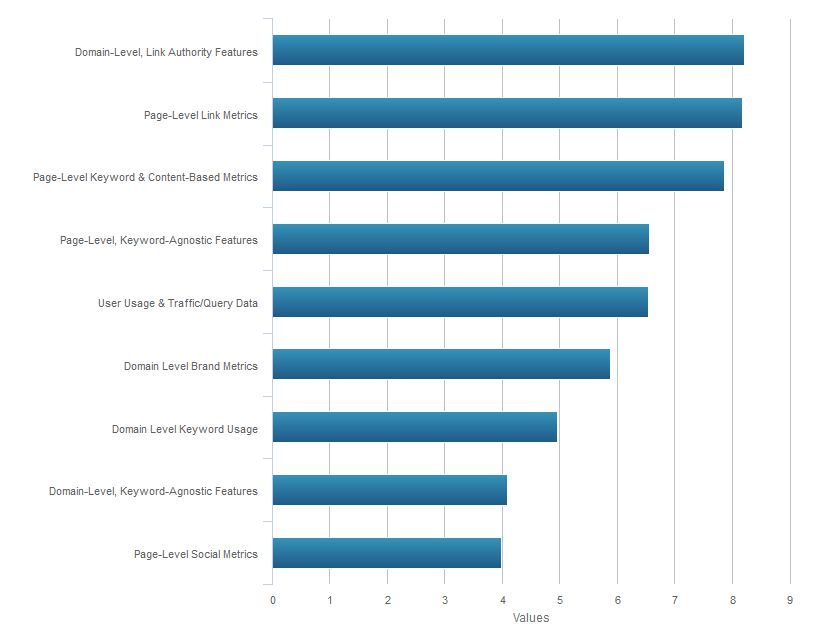SEO platform, Moz, has released its largest-ever study on ranking factors for SEO that influence where your website might rank on search engines. Unlike the Searchmetrics study from two weeks back, which simply described methods for getting ahead on Google, Moz actually ranked the ranking factors.
The comprehensive biennial study was conducted by interviewing 150 top search marketers on 90 different ranking factors, using correlation studies to measure them. Moz used its own data, as well as stats from Ahrefs, DomainTools and SimilarWeb. The data came from the suggested queries from the 22 top-level categories in AdWords, which provides 800 queries per category. For each query, Moz looked at the top 50 search results on Google.
The respondents rated the relative levels of influence exerted by broad areas of ranking factors on a scale of 1 (not influential) to 10 (highly influential).
Ranking factors influencing the Google search algorithm
Here factors such as Domain-Level, Link Authority Features (quantity of links, trust, domain-level PageRank, etc) and Page-Level Link Metrics (PageRank, Trust metrics, quantity of linking root domains, links, anchor text distribution, quality/spamminess of linking sources, etc) scored the highest at over 8 out 10 each:

Definitions:
- Domain-Level, Keyword-Agnostic Features: Domain name length, TLD extension, SSL certificate, etc.
- Domain-Level, Link Authority Features: Based on link/citation metrics such as quantity of links, trust, domain-level PageRank, etc.
- Domain-Level Keyword Usage: Exact-match keyword domains, partial-keyword matches, etc.
- Domain-Level Brand Metrics: Offline usage of brand/domain name, mentions of brand/domain in news/media/press, toolbar/browser data of usage about the site, entity association, etc.
- Page-Level Social Metrics: Quantity/quality of tweeted links, Facebook shares, Google +1s, etc. to the page
- Page-Level Link Metrics: PageRank, Trust metrics, quantity of linking root domains, links, anchor text distribution, quality/spamminess of linking sources, etc.
- Page-Level Keyword & Content-Based Metrics: Content relevance scoring, on-page optimization of keyword usage, topic-modeling algorithm scores on content, content quantity/quality/relevance, etc.
- User Usage & Traffic/Query: Data SERP engagement metrics, clickstream data, Visitor traffic/usage signals, quantity/diversity/CTR of queries, both on the domain and page level
- Page-Level, Keyword-Agnostic Features: Content length, readability, Open Graph markup, uniqueness, load speed, structured data markup, HTTPS, etc.
Ranking factors influencing keyword usage
This is how correspondents regarded the use of keywords on a page. Here correspondents considered ‘uniqueness of page content’, mobile friendliness (for mobile searches), page load speeds and relative CTR (click through rate) from Google search results pages as being most significant with scores of around 7.
Page-Level Link-Based Features
These features describe link metrics to the individual ranking page. Here the ‘Raw quantity of links from high authority sites’ ranked the highest, closely followed by ‘Topical relevance of linking pages’ and ‘Topical relevance of linking domains’ all scoring over 7 each. So the message here is links continue to be important but these must be from good quality sites and these sites should be relevant to your topic. For example, if your website is about running gear you will get the bigger boost from a link from an athletics club website compared to say a cookery website all other factors being equal.
Other significant factors included the following:
- Keyword is the exact match of the root domain name i,e. have a topic relevant domain name – 5.83
- Search volume for brand / domain – 6.54
- Quantity of unique linking domains – 7.45
- Freshness of content – 6.22
- Engagement with social media – 3.45
The surprise here is the low relative importance attached to social media. While important, other factors are much more significant.
Here are the top factors:
[amcharts id=”serial-1″]
The full survey results can be found here: Moz ranking factor survey 2015.
There is a lot of data to wade through here but aside from technical factors such as page speed, mobile friendliness, and page structure, building an authoritative brand continues to be an important ranking factor. Optimising a website to rank higher on Search Engine Results Pages is a continuous process rather a one-off fix, involving making small improvements over time. This type of survey is very useful to help us prioritise actions.
Further reading:






